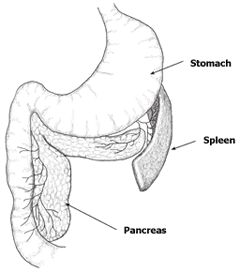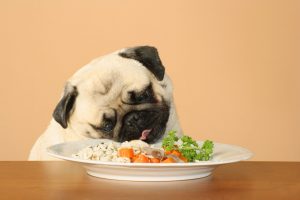Your Pancreatitis Questions Answered
I decided to write a blog about pancreatitis since I get so many inquiries on the subject. Way too many dogs are suffering from acute or chronic pancreatitis. These poor dogs are miserable and their pet parents are worried. It can be life threatening.
 The pancreas is V-shaped organ located behind the stomach. It has two major and very important functions:
The pancreas is V-shaped organ located behind the stomach. It has two major and very important functions:
1. It produces digestive enzymes that are released into the small intestine to help digest food.
2. It produces hormones, like insulin, that regulate blood sugar levels.
This organ produces the enzymes that digest all the major food groups – protein, fats, and carbohydrates. It also produces sodium bicarbonate, which serves to neutralize stomach acids. Poor function leads to weight loss as the body is unable to absorb nutrients and control blood sugar levels. In addition to poor digestion, when inflamed, the pancreas can cause digestive enzymes to leak into the abdomen and destroy surrounding organs. This cellular debris can enter the bloodstream and create further wide spread damage.
What Causes Pancreatitis?
Research is still inconclusive but there seem to be many factors involved. As with most diseases, the more exposure we all have to toxins and artificial food ingredients the harder the body has to work. People and dogs were never meant to eat a diet of heavily processed foods. Kibble is the most unnatural thing we can feed our dogs. It is hard on the liver, kidneys, and the pancreas.
Other contributing factors include the following:
– some veterinarians suggest that a high fat diet is the cause, but there is little scientific evidence to support this. Plus not all fats are the same. Saturated fats are very different from unsaturated fats like olive oil.
– low protein diets can predispose some dogs
– dietary indiscretions – getting into the garbage and eating foods the dog is not accustomed to
– medications – Phenobarbital used to control epilepsy
– certain antibiotics like sulfa drugs, metronidazole, chemotherapy drugs and diuretics
– corticosteriods – these are prescribed frequently and lower the immune response
– trauma – injury to the pancreas from car accidents or falls
– gall stones
– other theoretical causes include: viral infections, over vaccination, impaired blood flow, bloat, tumors of the pancreas and hereditary factors
– autoimmune diseases
– toxins
– vitamin/mineral deficiency from eating low quality processed foods
Which Dogs Are At Risk?
We see this most commonly in middle aged, elderly, and overweight dogs. It is also more common in dogs already suffering from diabetes, Cushing’s Disease, inflammatory bowel disease, or hypothyroidism.
Miniature schnauzers seem to have a genetic defect which causes them to have high blood fat levels. Other breeds like dachshunds, yorkies and other terriers and miniature poodles.
We also see increased chances of developing this condition when dogs are on long term use of medications.
Symptoms
Acute
 This comes on suddenly with loss of appetite, vomiting, and sometimes diarrhea. There may be restlessness or not wanting to move at all. The dog may be whimpering and in a hunched position. The abdomen may be rock hard and sensitive to the touch.
This comes on suddenly with loss of appetite, vomiting, and sometimes diarrhea. There may be restlessness or not wanting to move at all. The dog may be whimpering and in a hunched position. The abdomen may be rock hard and sensitive to the touch.
Chronic
Chronic pancreatitis can often have no symptoms. It may be a low grade inflammation that shows itself with subtle signs like skipping the odd meal, being a picky eater, discomfort after eating, depression, or weight loss. The stool can appear yellow and ‘greasy’. There may be a low grade fever or a swollen abdomen.
Diagnosing Pancreatitis
Routine blood tests may show an elevation of pancreatic enzymes but that is not always the case. There are now new tests called PLI (Canine Serum Pancreatic Lipase Immunoreactivity) and TAP (Trypsinogen Activation Peptide). These do provide a more definitive diagnosis. Thank you Texas A&M University for developing these new specific and sensitive blood tests!
Your vet may also want to take x-rays and do an ultrasound to rule out other causes.
Treatment
This is based on correcting the resulting dehydration and maintaining fluid/electrolyte balance. Your dog may be treated with IV fluids and given drugs to stop the vomiting and control pain. Food should be avoided for at least 24 hours to allow the organ a chance to rest.
In moderate to severe cases, hospitalization may be required.
Always consult your veterinarian if you suspect your dog may be suffering from pancreatitis.
Preventing It From Happening Again
There certainly is no guarantee that the condition will not reoccur, but there are some steps you can take to help reduce the chances.
 Obese dogs are more prone to pancreatitis. Please ensure your neutered dog has lots of exercise and watch her calorie intake. Avoid fatty, processed treats and stick with healthy snacks just like you would eat. Try watermelon, apples, carrots, and small pieces of cooked chicken. Feed higher protein with moderate carbohydrates to lose weight.
Obese dogs are more prone to pancreatitis. Please ensure your neutered dog has lots of exercise and watch her calorie intake. Avoid fatty, processed treats and stick with healthy snacks just like you would eat. Try watermelon, apples, carrots, and small pieces of cooked chicken. Feed higher protein with moderate carbohydrates to lose weight.
Stay away from processed foods and kibble.
A natural, moist diet will be easier on the digestive system and provide the much needed water, antioxidants, vitamins, and minerals that your dog needs to heal and protect the pancreas.
Make sure that the possible underlying condition is addressed.
Avoid the medications that can be linked to pancreatitis.
Avoid over vaccination.
Keep the indoor and outdoor environment free of herbicides, pesticides, and toxic cleaning solutions. By the way, vinegar and water is a healthy cleaning alternative to commercial cleaning products.
Add digestive enzymes to your dog’s diet. Herbs like yarrow help to reduce inflammation and improve blood circulation. Also try dandelion and burdock root to help with digestion. Add a good quality fish oil for the anti-inflammatory benefits of omega 3 fatty acids.
Marketing Over Mother Nature
 Our dogs deserve more than just cheap and easy meals. Scooping dry kibble out of a bag is certainly easy. Television marketing would like you to believe that dry processed ‘dog chow’ is healthy and nutritious.
Our dogs deserve more than just cheap and easy meals. Scooping dry kibble out of a bag is certainly easy. Television marketing would like you to believe that dry processed ‘dog chow’ is healthy and nutritious.
40 years ago fewer dogs had cancer, diabetes, kidney stones and pancreatitis. We are learning that diet is crucial to our health and well being. Let’s get back to the basics and feed a diet rich in high quality, wholesome meats, fruits, whole grains, and vegetables. Choose foods that you would be happy to feed any member of your family! Decrease the chances of chronic diseases by being proactive and not following the crowd.





